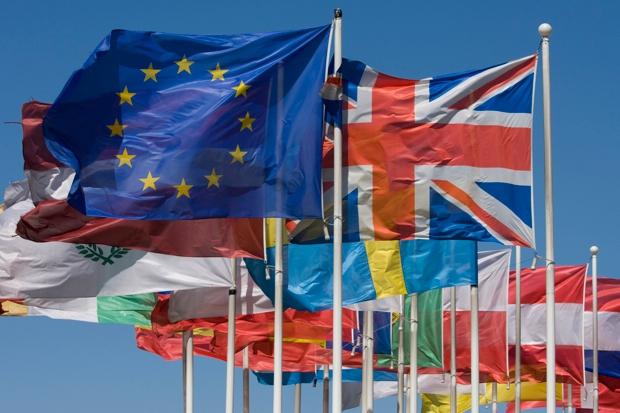What does a Tory eurosceptic look like? Loud chalk-stripe, a flash of red braces and the faintest whiff of a lunch-time gander at the Members’ wine list. Right? Wrong.
The economic trauma of the crash of 2008 is demanding that just as Conservative modernisation needs to be rebooted to suit the new Age of Austerity – with a focus on bold economic reformism to tackle welfare traps, worklessness and failing schools instead of the cultural gesturism of early modernisation – so too the crisis demands a rebooted euroscepticism. The Tory Party in Parliament has been transformed by the arrival of the Cameron generation: more entrepreneurial, impatient, ambitious and global in our outlook. In our 30s and 40’s, ‘Thatcher’s children’ have built careers in the world transformed by the reforms of the 80s and the enterprise economics she unleashed to such effect. Today’s Euroscepticism reflects that transformation. Far from the little England xenophobia of UKIP, the new generation of modern Conservative Euro-sceptics are bound by an entrepreneurial frustration at a European project which is too introverted and bureaucratic to win any Global Race.
As a co-chair of today’s Fresh Start Conference for EU Reform – a major gathering in London of over 200 European national and business leaders from across the continent – I know that todays euroscepticism is fundamentally different to that which haunted the leaders of a previous era. The cultural and political fundamentalism of early Euroscepticism 1.0 – an implacable rejection of any loss of sovereignty to ‘Johnny Foreigner’ that might dilute ‘Britishness’ and a deep suspicion of anything ‘European’ has been replaced by a much cooler headed debate about the single market and our trading relationship with the fastest emerging markets around the world. Globalisation, the end of the Cold War, the pace of technological innovation and the collapse of the Eurozone has made eurosceptics of us all. As the Eurozone nations reconstitute the Eurozone in the wake of the banking crisis our relationship will change. This is the UK’s opportunity to refashion a non-Eurozone membership which reflects our vision of being ‘in Europe but not run by Europe’.
The Prime Minister’s groundbreaking Bloomberg speech last year reflected this truth and set the tone for the new debate. Though some noisier fringe elements would suggest otherwise, it was a call that has been heeded by Conservatives up and down the country. Against the backstop of a guaranteed 2017 In Out referendum, the hard graft of turning complaints about the EU into a practical Programme for reform has started. Today’s Conference is the first major step in demonstrating the Prime Minister and Conservative Party’s commitment to leading the renegotiation and reform movement. We will only secure renegotiation with the support of other member states in a ‘grand reform alliance’, and to that we have to build those alliances and share our various wish lists to find common ground.
Europe is economically fragile. It desperately needs economic growth, trade and investment to create new jobs and businesses. While the US sorted out its banks and begun to return to some form of economic health, the eurozone is mired in a deflationary spiral, unable to quite commit to fiscal union yet powerless to be a force again until it does. Yet, as I point out in my Fresh Report on the EU and UK Science published last week, too often the EU is its own worst enemy. Last year BASF, the multi billion pound agro-chemical major, announced it was disinvesting its agricultural genetics research programme from Germany and moving to the USA because of the increasing hostility to GM in the EU. Rather than welcoming new technologies such as biotechnology, too often the EU stifles them with misguided regulations. Having spent fifteen years creating and financing new businesses in this sector, I know there are huge global markets eager for European life science exports in areas like healthcare and agriculture and renewable energy. At a time when the sclerotic and uncompetitive Eurozone is struggling and needs growth, such needless own goals make no sense.
The Prime Minister has done more for the cause of EU reform that any other British Prime Minister since we joined. Including Margaret Thatcher. The easy options of UKIP – like Labour’s energy price freeze – grab a headline but fail the test of basic credibility. The work of reforming the EU is long, technical and unglamorous. But it is the only way. There are no short cuts to reforming a European project which has become far too much about political regulation and not enough about how we can make Europe more competitive globally, and attract more investment and trade with the fastest growing emerging markets.
Don’t believe the headlines. Far from pin-striped brigades in the Parliamentary tea room banging on about Europe, a new practical, global, entrepreneurial euroscepticism is the default mode of the new Conservative generation in Parliament. Sceptical of Brussels’ over-regulation yet practical enough to know that a reformed EU is a cause worth fighting for. The long slog of renegotiation might be stodgier fare than the drama of storming out. But, as we all know, nothing worth doing is ever easy. The Prime Minister is right. We should be ambitious for Europe and work to agree a reform package to make it more entrepreneurial and globally competitive. We may not succeed. But not trying would be a major derogation of our duty, and a potentially huge missed opportunity to unleash the new cycle of global competitiveness, trade and investment in Europe we so badly need after the crash of 2008. Its Euroscepticism, but not as you knew it. It’s a progressive agenda for reforming the EU for an age of austerity and global competitiveness.
George Freeman MP is member of Parliament for Mid Norfolk and author of the latest Fresh Start and Open Europe Report on ‘The impact of EU Regulation on UK Life Sciences’.






Comments